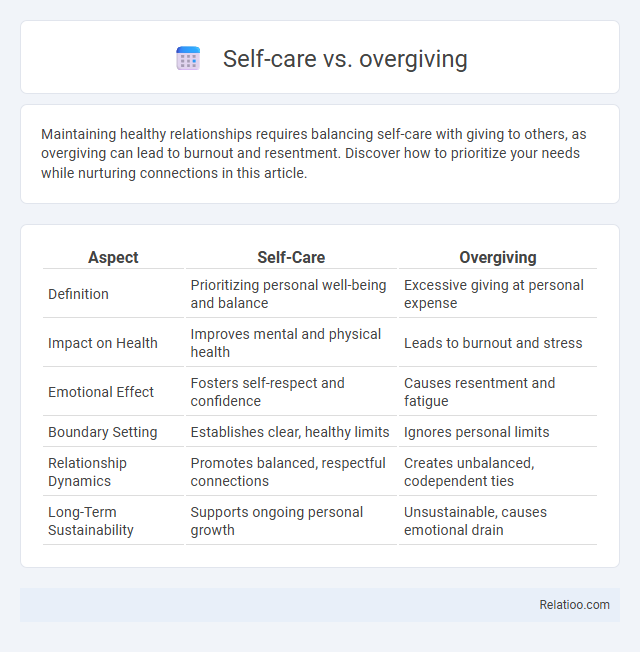Maintaining healthy relationships requires balancing self-care with giving to others, as overgiving can lead to burnout and resentment. Discover how to prioritize your needs while nurturing connections in this article.
Table of Comparison
| Aspect | Self-Care | Overgiving |
|---|---|---|
| Definition | Prioritizing personal well-being and balance | Excessive giving at personal expense |
| Impact on Health | Improves mental and physical health | Leads to burnout and stress |
| Emotional Effect | Fosters self-respect and confidence | Causes resentment and fatigue |
| Boundary Setting | Establishes clear, healthy limits | Ignores personal limits |
| Relationship Dynamics | Promotes balanced, respectful connections | Creates unbalanced, codependent ties |
| Long-Term Sustainability | Supports ongoing personal growth | Unsustainable, causes emotional drain |
Understanding Self-Care: The Foundation of Well-Being
Understanding self-care is crucial for maintaining your mental, emotional, and physical well-being, as it involves setting healthy boundaries and prioritizing your own needs. Overgiving, in contrast, often leads to burnout and exhaustion by neglecting these boundaries and overextending personal resources. Prioritizing self-care allows you to recharge and sustain the energy needed to support others effectively without compromising your health.
What Does Overgiving Look Like? Key Signs and Patterns
Overgiving manifests as consistently prioritizing others' needs over Your own well-being, leading to emotional exhaustion and burnout. Key signs include chronic people-pleasing, neglecting personal boundaries, and feeling resentment or depletion after acts of kindness. Patterns often involve difficulty saying no, seeking validation through helping, and an imbalance that sacrifices self-care in favor of others.
The Emotional Toll: Effects of Overgiving on Mental Health
Overgiving often leads to emotional exhaustion, increasing the risk of anxiety, depression, and burnout. Mental health deteriorates as individuals neglect self-care, resulting in chronic stress and feelings of resentment or low self-worth. Establishing boundaries is crucial to mitigate the psychological damage caused by constant overextension in relationships or work environments.
Boundaries Matter: Establishing Limits in Relationships
Establishing boundaries in relationships is essential to maintaining your emotional well-being, as self-care involves recognizing and respecting your limits. Overgiving often leads to emotional exhaustion and resentment when you sacrifice your needs to please others. Setting clear, healthy boundaries ensures mutual respect, prevents burnout, and fosters balanced connections where both parties thrive.
The Balance Between Helping Others and Self-Preservation
Maintaining a healthy balance between self-care and overgiving is essential for sustainable well-being and effective support to others. Overgiving often leads to emotional exhaustion and burnout, compromising personal health and diminishing one's ability to help. Prioritizing self-preservation alongside compassionate assistance ensures long-term resilience and meaningful relationships.
Common Myths About Self-Care and Selfishness
Self-care is often misunderstood as selfishness, but it fundamentally involves prioritizing one's physical, mental, and emotional well-being to maintain overall health and effectiveness. Overgiving occurs when individuals excessively prioritize others' needs at the expense of their own boundaries, leading to burnout and resentment. Common myths misconceive self-care as indulgence or laziness, while true self-care supports sustainable care for oneself and others without guilt or neglect.
Practical Strategies for Prioritizing Self-Care
Prioritizing self-care involves setting clear boundaries to prevent overgiving, which can lead to burnout and emotional exhaustion. Practical strategies include scheduling regular time for personal activities, practicing mindful awareness to recognize when giving becomes detrimental, and communicating needs assertively to maintain balance. Emphasizing self-care over overgiving ensures sustainable well-being and healthier relationships.
How to Recognize When You’re Overgiving
Recognizing when you're overgiving involves noticing signs such as feeling emotionally drained, neglecting your own needs, or frequently sacrificing your well-being for others. Your energy levels decreasing despite continuous efforts to help indicate an imbalance in self-care and boundaries. Paying attention to these signals helps maintain healthy relationships and supports your mental and physical health.
Reclaiming Your Energy: Steps to Shift from Overgiving to Balance
Reclaiming your energy involves recognizing the signs of overgiving, such as emotional exhaustion and diminished personal boundaries, and adopting intentional self-care practices that prioritize your well-being. Setting clear limits on commitments and learning to say no protect your mental and physical health, fostering sustainable relationships and personal growth. Balancing generosity with self-respect cultivates resilience, prevents burnout, and empowers you to invest energy in pursuits that truly align with your values and needs.
Cultivating a Sustainable Self-Care Routine for Lasting Wellness
Cultivating a sustainable self-care routine involves balancing personal needs without tipping into overgiving, which can lead to emotional exhaustion and burnout. Prioritizing activities that replenish physical, mental, and emotional energy fosters long-term wellness and resilience. Consistent self-awareness and boundary-setting are essential to maintain this equilibrium and ensure self-care remains a restorative practice rather than an additional stressor.

Infographic: Self-Care vs Overgiving
 relatioo.com
relatioo.com